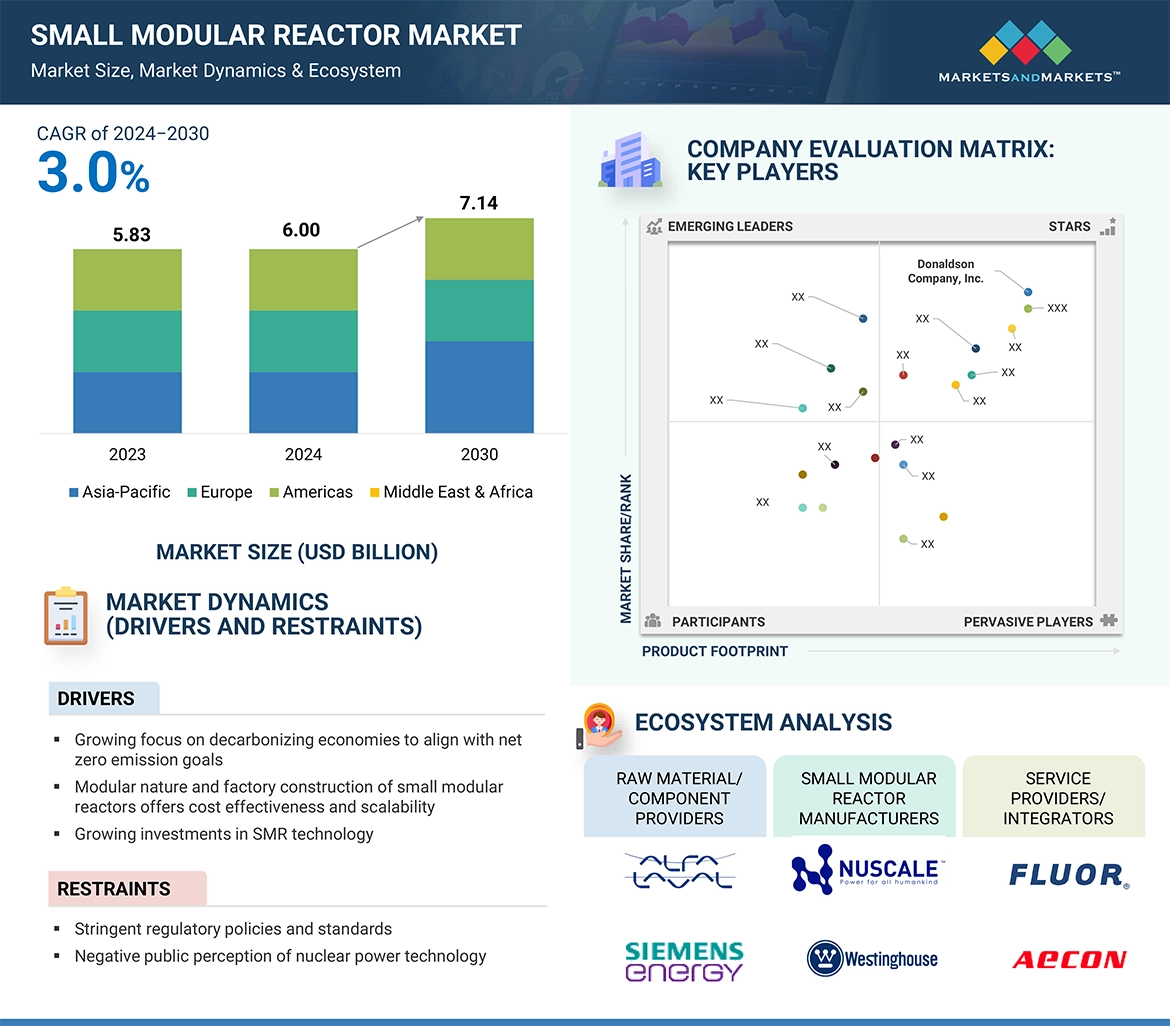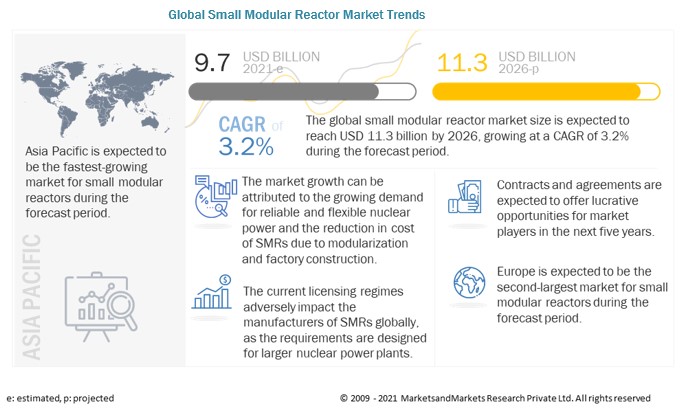Browse in-depth TOC on "Small Modular Reactor Market"
150 - Tables
80 - Figures
250 – Pages
Download PDF Brochure @ https://www.marketsandmarkets.com/pdfdownloadNew.asp?id=5001546
Gases segment is expected to result in the segment occupying the second largest market share of the Small modular reactor
The
gases segment accounted for a share of 22.6% of the small modular
reactor market in 2022. The gas-cooled reactor uses helium as a coolant
medium during the operation and can be easily pressurized and maintain a
stable high temperature facilitating higher efficiency in the
operations. Using gas as a medium in the reactor can stop the occurrence
of corrosion on the surfaces of the reactor, which reduces the need
for maintenance. These operational advantages are pushing the growth of
the gases segment. Gas-cooled reactors use graphite as a neutron
moderator and carbon dioxide gas as the coolant.
High–temperature reactors by type is estimated to be the second largest and second–fastest growing market
The
high-temperature reactor segment accounted for a 22.6% share of the
small modular reactor market in 2022. High-temperature reactors are
Generation IV technology reactors characterized using a graphite
moderator and gases such as helium, carbon dioxide, or nitrogen as the
primary coolants. The most developed HTRs are high-temperature
gas-cooled reactors (HTGRs), which include two main types of reactor
designs: pebble-bed reactors (PBR) and prismatic block reactors (PMR).
These reactors can reach temperatures of up to 1,000° C and may use
fuels that contain uranium enriched up to 20.0%, which has higher
enrichment than LWR fuel. These reactors provide immense potential use
of thorium-based fuels. HTGRs produce ~40% less high-level waste per
unit of energy produced and less plutonium content compared with a
single-pass typical cycle of LWRs. The waste reduction is a result of
higher thermal efficiencies and increased burnup in HTGRs. The storage
and disposal requirement of high-temperature reactors is about 50 times
lower for HTGRs compared with LWRs. However, the regulators and
designers face several challenges while developing and licensing HTRs,
such as limited design experience, lack of construction codes, and
unresolved questions concerning fuel development and safety analysis
tools.
Speak to Analyst @ https://www.marketsandmarkets.com/speaktoanalystNew.asp?id=5001546
Power Generation is estimated to be the fastest growing market
The
power generation segment held a 34.15% share of the small modular
reactor market in 2022. SMRs are expected to be used for power
generation, as they have simpler designs, economies of series
production, short construction times, and reduced siting costs compared
with large nuclear power plants. The power generated by SMRs is
expected to be economical compared with other low-carbon alternatives
and they help reduce carbon emissions and meet new energy demands. SMRs
provide a stable and reliable baseload power supply, which makes them
suitable for replacing and optimizing the use of retiring coal and
other fossil fuel-fired power plants and replacing aging
infrastructure. SMRs also have load following capabilities and can be
integrated with renewable energies to provide flexible power, as these
reactors can vary their output to meet the fluctuations in power
produced using renewable energy. SMRs can be used to power isolated
grid systems, remote communities, islands, and mining sites. All these
factors are likely to boost the growth of the market for the power
generation segment.
Grid–Connected segment by connectivity is estimated to be the second–fastest growing market
The
grid-connected segment held a 65.03% share of the total small modular
reactor market in 2022. Grid-connected SMRs have the potential to
complement variable renewable energies, such as wind and solar, and
integrate with smart grids and energy parks. SMRs can provide baseload
power for grid-connected operations and can vary their output to meet
the fluctuations in the supply of power produced by renewable sources.
SMRs are expected to phase out conventional coal-fired power plants, as
utilities want to replace retiring coal-fired plants with baseload
plants of similar size that do not produce greenhouse emissions. SMRs
can support grid modernization activities, such as smart grid and load
growth, and help replace the existing aging infrastructure. These
reactors can restart without receiving energy from the grid. This can
help an electricity grid meet the system requirements in terms of
parameters such as voltage, inertia, reactive capacity, and frequency
when recovering from an outage.
Marine segment by location is estimated to be the second largest and second–fastest growing market
The
marine segment held a 7.36% share of the small modular reactor market
in 2022. SMRs can be deployed in marine environments either as
barge-mounted floating power units or underwater power units. Marine
SMRs generally use pressurized-water reactor technology. These reactors
have long core lives and require little refueling. Marine SMRs provide
several flexible deployment options, such as nuclear icebreaker ships
and floating nuclear power plants.
Make an Inquiry @ https://www.marketsandmarkets.com/Enquiry_Before_BuyingNew.asp?id=5001546
Single–module power plant segment by deployment is estimated to be the second largest and second–fastest growing market
The
single-module power plant segment held a 76.30% share of the small
modular reactor market in 2022. Single-module SMR plants are stand-alone
units that may be used individually to meet niche energy requirements
or localized demand. Larger single-module SMR plants could be used to
replace small fossil-fuel units or deployed for distributed generation.
The licensing of single-module SMRs is expected to be simpler than that
of multi-module SMRs, as the current regulatory and licensing
frameworks generally rely on an extensive experience base, with
single-module larger nuclear plants using light-water reactor
technology. Single-module SMRs, especially under 10 Mwe, serve remote
locations deprived of electricity and district heating applications.
They incorporate all the essential components, such as the power
generation unit, turbines, generators, control systems, and necessary
support infrastructure, into a single unit.
Upto 100 MW segment by power rating is estimated to be the fastest growing segment in the small modular reactor market
The
power rating of up to 100 MW holds a market share of 16.9% share of
the small modular reactor market in 2022. SMRs are characterized by
their compact size and modular design. The reactor unit can be
manufactured in a factory and transported to the installation site. The
modular design allows for scalability, where multiple SMR units can be
deployed together to meet varying energy demands. The primary
application of a 100 MW SMR is power generation. It can serve as a
standalone power plant, providing clean and reliable electricity to
communities, industries, or remote locations. The excess heat generated
by a 100 MW SMR can be utilized for district heating, where thermal
energy is distributed to nearby residential, commercial, and
institutional buildings for space heating and water heating purposes.
Europe likely to emerge as the second-largest region in Small modular reactor market
Europe
accounted for a 30.3% share of the global small modular reactor market
in 2022. The scope of the European small modular reactor market
includes Russia, the UK, France, and the Rest of Europe. The Rest of
Europe includes Italy, Luxembourg, Denmark, the Czech Republic, Sweden,
Ukraine, Finland, Estonia, Poland, and Romania. According to the BP
Statistical Review of World Energy 2022, nuclear energy accounted for
about 28.4% of the region’s electricity generation mix. The region
accounted for 30.2% of the global nuclear power consumption.
Investments
for the development of SMRs and the shift toward the use of clean
energy to combat climate change are increasing the opportunities for
the deployment of SMRs in this region. For instance, in November 2020,
the government pledged USD 298 million to SMRs in 2021 as a part of the
UK Research and Innovation (UKRI) through the Low-Cost Nuclear (LCN)
program. In November 2019, UKRI provided an initial match funding of
USD 23 million to the UK SMR consortium, led by Rolls-Royce, for the
development of a conceptual SMR design. In June 2021, Rosatom (Russia)
announced its plans to invest USD 7 billion in new nuclear technologies
by 2030. The plan includes the development of four floating power units
using RITM-200 reactors (55 MWe each) by the end of 2028 for the
Baimskaya Mining and Refining Plant in Chukotka. It also aims to
commission a land nuclear power plant that utilizes RITM-200 SMR
technology by 2030 for the Kyuchusskoye gold deposit in Yakutia. Rosatom
also has plans to launch pilot units, including SHELF and ELENA, in
remote regions of the country. It intends on concluding the first export
contract for its SMR power plants at the end of 2026. Factors such as
the integration of SMRs with intermittent renewable energy and the
decarbonization of the energy sector enhance the growth of the small
modular reactor market in Europe.
Request Sample Pages @ https://www.marketsandmarkets.com/requestsampleNew.asp?id=5001546
The
overall key players are Westinghouse Electric Company LLC (US),
NuScale Power, LLC. (US), Terrestrial Energy Inc. (Canada), Moltex
Energy (Canada), GE Hitachi Nuclear Energy (US), X Energy, LLC. (US), X
Energy, LLC. (US), General Atomics (US), ARC Clean Energy, Inc.
(Canada), LeadCold Reactors (Sweden), Rolls-Royce (UK), Ultra Safe
Nuclear (US), Toshiba Energy Systems & Solutions Corporation
(Japan), Tokamak Energy Ltd. (UK), SNC-Lavalin Group (Canada),
Afrikantov OKB Mechanical Engineering (Russia), China National Nuclear
Corporation (China), Framatome (France), U-BATTERY (UK), and Seaborg
Technologies (Denmark).
About MarketsandMarkets™
MarketsandMarkets™
is a blue ocean alternative in growth consulting and program
management, leveraging a man-machine offering to drive supernormal
growth for progressive organizations in the B2B space. We have the
widest lens on emerging technologies, making us proficient in
co-creating supernormal growth for clients.
The B2B economy is
witnessing the emergence of $25 trillion of new revenue streams that
are substituting existing revenue streams in this decade alone. We work
with clients on growth programs, helping them monetize this $25
trillion opportunity through our service lines - TAM Expansion,
Go-to-Market (GTM) Strategy to Execution, Market Share Gain, Account
Enablement, and Thought Leadership Marketing.
Built on the ’GIVE
Growth’ principle, we work with several Forbes Global 2000 B2B
companies - helping them stay relevant in a disruptive ecosystem. Our
insights and strategies are molded by our industry experts,
cutting-edge AI-powered Market Intelligence Cloud, and years of
research. The KnowledgeStore™ (our Market Intelligence Cloud)
integrates our research, facilitates an analysis of interconnections
through a set of applications, helping clients look at the entire
ecosystem and understand the revenue shifts happening in their industry.
To find out more, visit www.MarketsandMarkets™.com or follow us on Twitter, LinkedIn and Facebook.
Contact:
Mr. Aashish Mehra
MarketsandMarkets™ INC.
630 Dundee Road
Suite 430
Northbrook, IL 60062
USA : 1-888-600-6441
newsletter@marketsandmarkets.com

